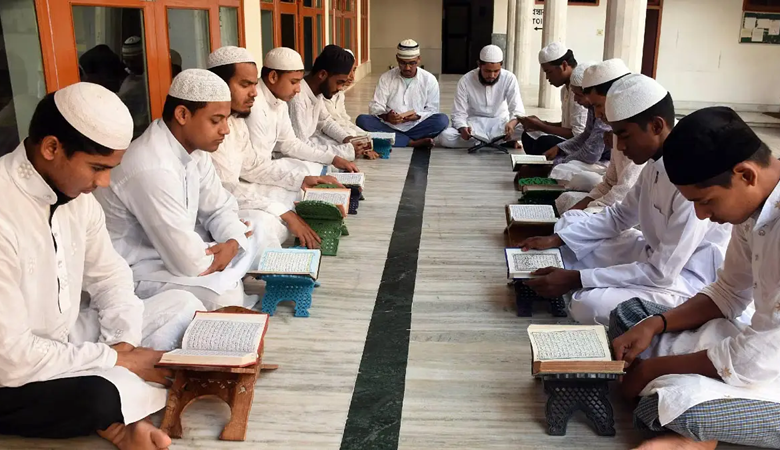The education stagnation of Madrasa System

News Mania Desk / Piyal Chatterjee / 25th October 2024
The National Commission for Protection of Child Rights’ (NCPCR) recommendation and the subsequent measures of the states and the Center to shut down government-funded madrasas for allegedly violating the Right to Education (RTE) Act were stayed by the Supreme Court on Monday. Additionally, the Court halted recent directives from the governments of Tripura and Uttar Pradesh that ordered non-Muslim children enrolled in government-aided madrasas and students from unrecognized madrasas to be transferred to government schools.
Jamiat Ulama-i-Hind filed a plea contesting the Uttar Pradesh government’s decree, claiming that it infringed upon minorities’ rights to create and run their own educational institutions. A letter from the NCPCR, the child rights panel, served as the basis for the aforementioned order. Chief Justice D Y Chandrachud and Justices J B Pardiwala and Manoj Misra led a Supreme Court panel that considered the appeal and sent notifications to the federal government and the states, requesting a response within four weeks.Additionally, the Court decided that any consequential orders that the states may issue would similarly be held until further notice.
In September, the Supreme Court received an affidavit from the National Commission for Protection of Child Rights (NCPCR) contesting the Allahabad High Court’s ruling to invalidate the UP Board of Madarsa Education Act, 2004. The panel contended that the Right to Education (RTE) Act of 2009 is violated and that the education offered in madrasas is incomplete.
According to NCPCR’s affidavit, madrasas are not fulfilling children’s fundamental entitlement to a quality education. “The fundamentals of a quality education are not being offered by madrasas. The affidavit said, “Children are denied not only appropriate education, but also a healthy environment and better growth opportunities.”
While Islamic instruction is the main focus of madrassas, many of them lack the necessary elements of formal education, including competent academic curricula, trained teachers, and adequate facilities. Students are disadvantaged as a result when compared to their counterparts in regular schools.The report also included examples of how madrassa students were refused access to basic amenities including clothing, textbooks, and the midday meal program. Many madrassas lack accountability, and reports of physical safety issues, including inadequate infrastructure and child rights violations, have been made.
Education in madrasas is restricted to word and letter knowledge. Additionally, the madrasa and contemporary education in that field diverge significantly. The main objective of education in madrasas is rote memorizing of the text. Only at the highest levels of madrasa education is it expected that students will rewrite and express themselves in writing, something that is not typical at the mid and lower levels.
Such discrimination in Madrasas could not only harm children but also put them in a position where they are behind their peers in the professional field. The ordinary individual who attended a madrasa is not the same as the average person who received modern education; they are like persons from two distinct eras. In a madrasa, students are taught obedience and imitation, while in modern education, they are armed with means of experimentation and research. The contemporary educational system encourages students to think, innovate, create, and adapt while measuring, adjusting, and developing knowledge based on discoveries. Creativity is seen as heresy in the madrasa system, and any departure from the original texts is penalized. However, successful students and researchers in the current educational system focus on critically interacting with the original materials, and anyone who questions established theories and scientific principles in order to produce new science is commended.






